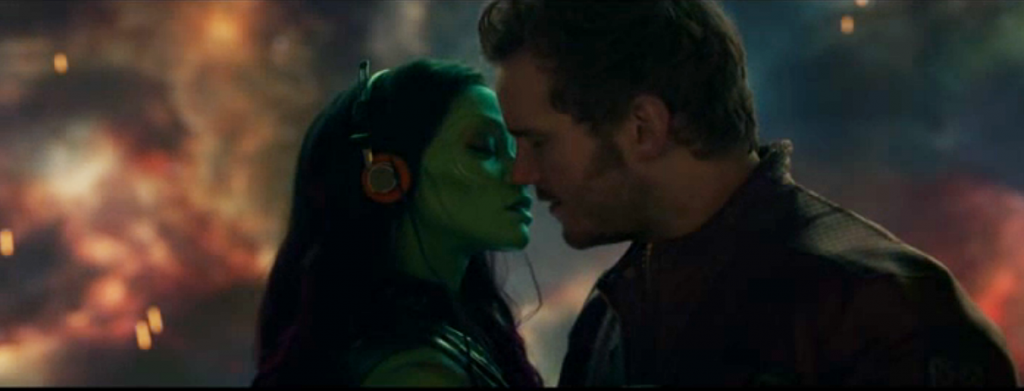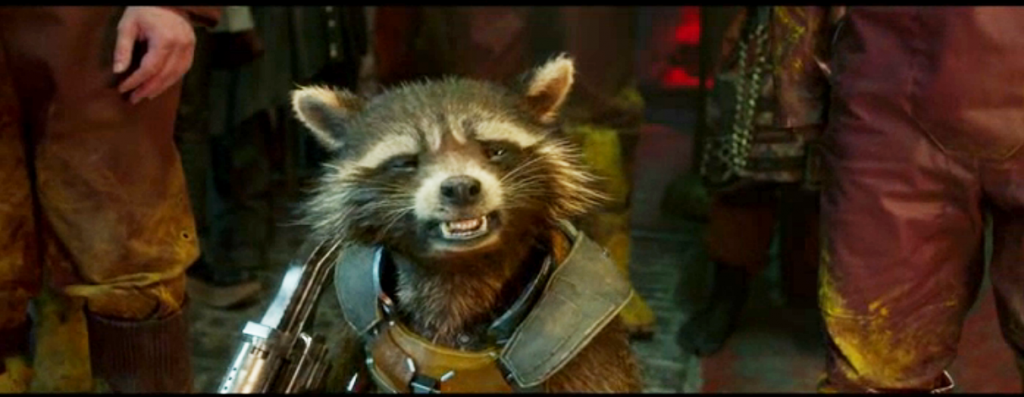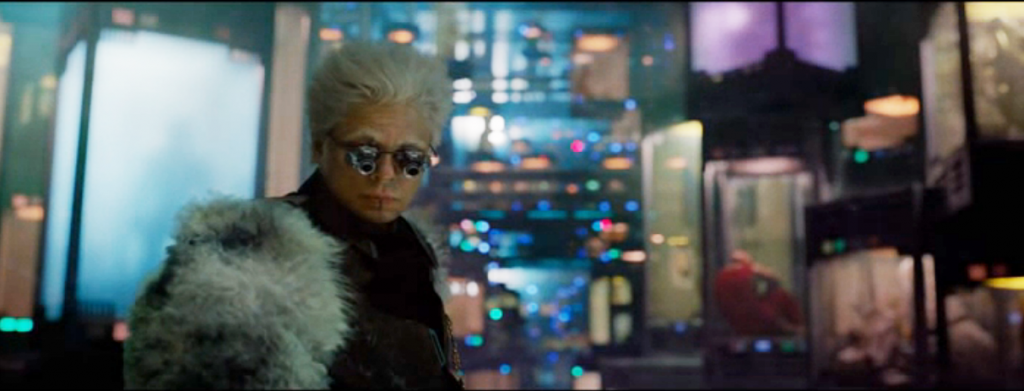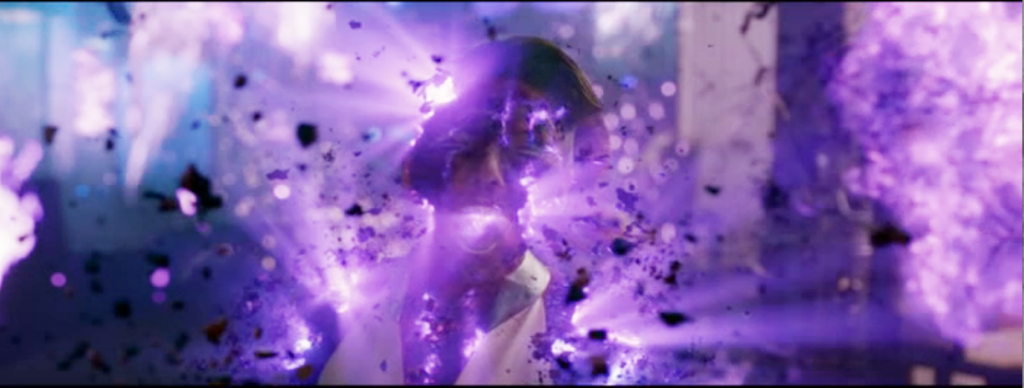Guardians of the Galaxy part 7
While Rocket, Groot and Drax drink and fight in the next room, Peter makes time with Gamora, seducing her with the power of cheap Earth pop music. The song he chooses is “Fooled Around and Fell in Love,” his wish being, of course, that Gamora will let her guard down, “fool around,” so to speak, and “fall in love” with Peter (or at least fall in bed). I bring up these kind of obvious points to link this scene to the opening of the movie, where Peter protected himself from the harsh reality of his mother’s illness by listening to “I’m Not in Love.” Both songs, for Peter, are types of lies, used to distract, either himself from his pain or a woman (well, alien female) from his young-male shenanigans. In the first case, he’s trying to toughen himself up, tell himself he does not feel. In the second case, he’s trying to loosen Gamora’s defenses, get her to feel something before she has a reason. Gamora, for her part, is almost, but not quite, seduced by Peter’s strange Earth music and accompanying “pelvic sorcery.”
Drax’s fight with Rocket, which happens mostly offscreen, ends with Rocket’s little raccoon heart broken. Drax, in his literalist way (the performances in Guardians are all wonderful, but Dave Bautista as Drax is a comic gold mine, he lands every beat he’s given with the deftness and precision of a prima ballerina) has offended Rocket by, well, by speaking the literal truth. Rocket cedes Drax’s two main points, “He speaks of affairs he knows nothing about” and “He has no respect,” but the “vermin” part, that stings. Rocket is rude by choice, but he is vermin, that is to say, a raccoon, by birth.
Why does the movie pause to examine Rocket’s feelings about being born? The script hints at his inner pain earlier, but here (now that he’s drunk), his heart appears on his sleeve. Rocket’s tragedy, it would seem, is not that he’s a raccoon (a scavenger, a looter of garbage cans and picnic baskets), but that he’s an intelligent raccoon. He is aware enough of his situation that he knows that something is very wrong with the world. In this scene, he is able to articulate what the other characters in the movie cannot: that they are all sad, lonely and terrified, and feel they don’t deserve their fates. The tragedy of humanity, I’ve often felt, is that we are just smart enough to realize there is something beyond us but utterly incapable of understanding what that might be. God was invented to comfort us in our cosmic terror, to create order, however mysterious, in a universe that wants very badly to kill everything and doesn’t believe in happy endings. That sense of cosmic terror, the devastating unfairness of the universe, applies to everyone in Guardians, even some of the bad guys. This movie of monsters and aliens is stuffed full of humanity. Rocket speaks for everyone when he says “I didn’t ask to be made, I didn’t asked to get torn apart and put back together, over and over again, like some little monster.” Rocket speaks literally, but everyone in Guardians has been torn apart and put back together again, over and over — that’s called “life.” And yes, they all feel, on some level, that they are “some little monster.” Peter can’t offer anything to comfort Rocket, except money, the key to the soul of a pirate.
Drax, frustrated with the disappointing lack of Ronan-killing on this trip, stomps off, and the rest of the gang goes to meet The Collector. What does the Collector want? For all I can tell, he wants nothing but what his namesake suggests. The Broker brokers, the Collector collects, the Destroyer destroys, the Accuser accuses. In Thor: The Dark World, we see the Collector receive the Aether from the Asgardians for safe-keeping, so it appears that the Collector’s holdings are quite secure. (“One down, five to go” says the Collector upon receipt of the Aether, but there’s no sense here that he’s planning to take over the universe or anything, just that he can’t wait to have all six stones in his possession.)
The Collector is spellbound by Groot; he has never seen a Groot before. He informs Groot that his payment will double as a promise to donate his body to the Collector’s collection. Following as it does Rocket’s lines about the tragedy of his existence, it’s both poignant that the Collector has no interest in Rocket (or any of the other one-of-a-kind members of the gang) and that Groot seems perfectly okay with giving his body up when he’s done with it. (The joke is on the Collector: Groot does not die in any conventional sense. But let’s not get ahead of ourselves.)
The Collector gives the gang a brief, painless info-dump on the object inside the orb, an “infinity stone” related to the Tesseract that drives the narratives of Thor, Captain America: The First Avenger and The Avengers, and the Aether that drives the narrative of Thor: The Dark World. It’s a brilliant invention, the Infinity Stones, a passel of Maguffins, lifted from the comics, that can circulate through a whole series of movies. The magnitude of the MCU’s achievement cannot be understated and, as one reader suggested the other day, they, not any individual movie, but the MCU as a whole, is this generation’s Star Wars. Tying the intergalactic hi-jinx of Guardians to the comparatively grounded real-world grit of Iron Man is a stroke of genius.
At the moment the gang is about to get paid, the Collector’s assistant decides to kill herself by grasping the Infinity Stone. It’s one of the few poorly-motivated actions in the script; if the assistant was that upset by the Collector’s treatment, surely there were other options for suicide around the confines of Knowhere. We’re also not given a very clear picture of the Collector’s cruelty. Sure, he put his last assistant in a vitrine, but the only thing we’ve seen him tell this assistant to do is work harder at cleaning some glass. The current assistant can’t even say she shares the cosmic horror of the other characters; there are plenty of pink-skinned aliens like her littering the galaxy. But no one wants to be a slave, a concept that binds her to the other protagonists (not to mention Ronan, who feels enslaved by the Xandarians). But we, the audience, need to see the power of the Infinity Stone, and the Collector’s showplace is duly destroyed by the assistant’s flameout, his collection freed in the explosion. In her death, the assistant frees all the Collector’s slaves.
Gamora decides that the thing to do is take the Infinity Stone to the Nova Corps. Oddly enough, given the ending of Thor: The Dark World, it seems to me that Nova Corps’ best idea would be to hand the orb over to the Collector for safekeeping. Peter, on the other hand, would still rather find a buyer. So when Gamora insults him as “despicable, dishonorable and faithless,” Peter’s real problem is that he’s getting further from his goal, his long-ago hinted-at goal, of being respected, of being taken seriously. (Gamora’s sudden urge to “go straight,” to hand the orb over to the galactic equivalent of the UN, both speaks to her naivety and, unfortunately, makes her a narrative stick-in-the-mud, the Skylar White of Guardians, a position she does not deserve. In a narrative full of pirates and ne’er-do-wells, she’s Will Turner all of a sudden.
Unfortunately for Gamora, Drax, in his impatience, has summoned Ronan to Knowhere, ready to meet his destiny.




The Collector’s assistent probably wasn’t trying to commit suicide. I interpreted that scene as her attempt to gain power over her own life and power over her “master.” It just didn’t go well for her, since the Infinity Gem tends to destroy mortal aliens who grasp it. Ronan and the Guardians being the exceptions to that rule, but it takes all four of the Guardians in the final battle to handle the strain of holding the Infinity Stone.
I don’t remember them spelling this out in ‘GotG,’ but in ‘Thor: The Dark World,’ I believe they said that it’s dangerous to keep more than one Infinity Stone in the same place, and since the Asgardians already had the Tesseract, they gave the Aether to the Collector. Gamora might not know this, but by those rules, it’s good for the Orb to be somewhere else.
MINOR MARVEL MOVIE SPOILERS AND SPECULATION AHEAD
Rumor has it that the glowy stone on the end of Loki’s spear from ‘The Avengers,’ which we see in the mid-credits scene of ‘Captain America: The Winter Soldier,’ is also an Infinity Stone, and it seems likely that another one will be involved in the plot of ‘Dr. Strange’ somehow. Marvel has announced that the 3rd and 4th Avengers movies, ‘Infinity War 1 and 2,’ will be released within a year of each other, and will presumably very Thanos-driven. What I think would be fun is if ‘Infinity War 1’ unfolds as a “race” to gather the Infinity Stones, with the Avengers and other Marvel characters (the Guardians of the Galaxy, Dr. Strange, etc.) teaming up and going to Xandar, the Asgardian trophy room (which has the Infinity Gauntlet, too), the Collector’s collection, etc. and get them before Thanos gets them first.
I never got the impression that the Carina, the Collector’s assistant, was intentionally committing suicide by grabbing the stone. Rather, I interpreted the scene as an attempt by a slave hoping to use its power against her master.
That’s how I interpreted it, too. But that raises the question of why she thought she could get away with it after he just moments ago said a mortal could not. Maybe she wasn’t paying attention, possibly blinded (and deafened) by naive optimism. And, clearly, desperation.
I agree with Sasha.
Drax is an interesting contrast to Peter and most of the other Guardians. (He’s also, as you point out, a consistent gold mine of comedy; and later on, the source of a very uncomfortable line about Gamora that doesn’t really make literal sense.)
That is, almost everyone else has parent / origin issues: Peter’s got his mother’s death, Gamora has her parents’ death and subsequent raising by Thanos, Rocket’s got his painful and isolating origin story, and even Ronan talks about staying true to the old ways and being motivated by his dad’s and granddad’s death in the Kree-Xandar war.
But Drax didn’t get into this because of his parents, but because he was a parent. It’s odd to look at the guy who looks most like a humorless brute and think that he had the most emotional maturity of the group, pre-Ronan. But then, once Ronan kills his family, we’re back to ideas about revenge that don’t feel so adult. It’s depressing as hell: you’re all alone in the universe, until you make a family for yourself–and then you’ll always be in danger of losing that family, too.
Logistically, I wonder how much of the discussion in the room was “We can’t have literally everyone motivated by dead parents, can we?”
“The tragedy of humanity, I’ve often felt, is that we are just smart enough to realize there is something beyond us but utterly incapable of understanding what that might be. God was invented to comfort us in our cosmic terror, to create order, however mysterious, in a universe that wants very badly to kill everything and doesn’t believe in happy endings.”
This reminds me very much of Andrea del Sarto by Robert Browning, in particular the line, ‘Ah, but a man’s reach should exceed his grasp or what’s a heaven for?”
It also reminds me of the jaw-dropping monologue you get from Matthew McConaughey’s character in the first (?) episode of True Detective:
“I think human consciousness, is a tragic misstep in evolution. We became too self-aware, nature created an aspect of nature separate from itself, we are creatures that should not exist by natural law. We are things that labor under the illusion of having a self; an accretion of sensory, experience and feeling, programmed with total assurance that we are each somebody, when in fact everybody is nobody. Maybe the honorable thing for our species to do is deny our programming, stop reproducing, walk hand in hand into extinction, one last midnight, brothers and sisters opting out of a raw deal.”
Todd’s line there also reminded me of the opening of Call of Cthulhu:
“The most merciful thing in the world, I think, is the inability of the human mind to correlate its contents.”
Something the True Detective writers were certainly aware of as well.
Bit of a digression from the main point here, but looking back at Todd’s original line also also reminded me of my personal lens for differentiating fantasy from science fiction from horror. With the caveat that this doesn’t map well to actual shelf categories (it’s just a useful way of looking at them and thinking about why a story with the trappings of one has the feel of another), that lens is:
1) In fantasy, the universe is benevolently disposed toward the protagonists (and “good people” in general);
2) In horror, the universe is malevolently disposed toward them; and
3) In science fiction, the universe is mechanistic and indifferent.
Doesn’t Darko Suvin say something like that in his work on SF? (Or: Marie, how much did our graduate school experiences overlap?)
Also funny, since the name of Lovecraft came up, to see how his stories–and other people’s takes on them–waver between horror (Cthulhu hates you and wants to eat you!) and sf (Cthulhu doesn’t really notice you but will you eat because you are there!)
(((@#$@#! Darko Suvin %$%@#$!)))
Er, ahem. 🙂 Yes, I read Suvin in grad school. I also wrote a paper that was, ahem, uncomplimentary to his ideas. Suvin’s idea of cognitive estrangement has merit, but as a critical approach to SF as a whole, it reeks of the high school kid who’s trying to get in with the cool crowd (literary fiction) by pretending he doesn’t know any of his grade school friends (fantasy, also 95% of what people call science fiction).
I’m still proud of the title for that paper — “To the Scorn of Her Comrade Planets: Cognitive Estrangement and The King of Elfland’s Daughter“. The pre-colon part of that title is a quote from the novel I was discussing, and it fits really well with that particular aspect of Suvin’s argument.
Hit “post” too soon. Yes, Suvin identifies a fairy tale as being “oriented positively toward its protagonist.” I can’t recall whether he looks at the flip side of that, with horror, but he’s at least got one side of the equation there.
Ah, the poetry of the grad school paper title. I still think in colons sometimes (too often). Worse was teaching composition to undergrads and they’d take some tossed off paper title example of mine and ask “Is that how we should write titles?” Tainted so young.
As for Suvin, he has a paper later where he wonders out loud about being wrong about fantasy not being cognitively estranging. Which I kind of love because I love writing a book that says one thing and then writing a tiny paper that says “maybe not” years later.
Do you happen to recall the title of that paper? Because I’d like to see Suvin eat crow I mean reconsider his ideas on my genre of choice.
I wouldn’t characterize him as eating crow so much as noting that maybe, if he were hungrier, he might be able to fit some crow in, maybe after a little nap.
I don’t know specifically what paper it is; but in my memory, it was an afterword and from my notes, it looks like I was thinking of Learning from Other Worlds (2000), edited by Patrick Parrinder.
Yeah, that line is right up there with “Call me Ishmael” in terms of authorial impact.